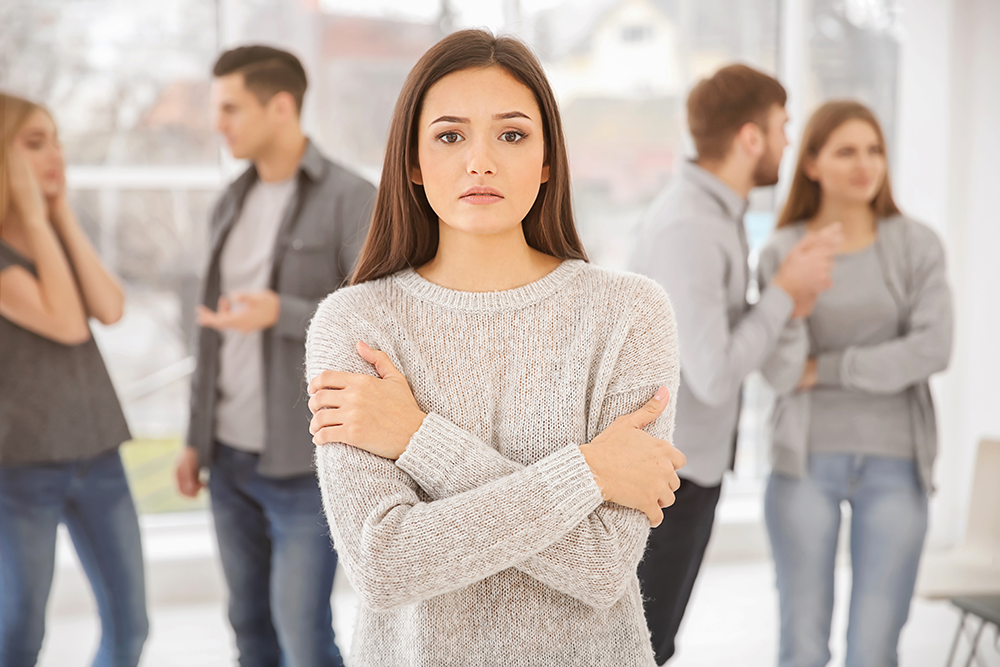SOCIAL ANXIETY DISORDER
Social anxiety disorder, also known as social phobia, is a mental health condition characterized by an intense and persistent fear of social situations. While many people may experience some degree of shyness or nervousness in social settings, social anxiety disorder goes beyond these feelings, significantly impacting daily life. Individuals with social anxiety often experience extreme distress and anxiety in social interactions, fearing scrutiny, judgment, or embarrassment by others.
One of the key features of social anxiety disorder is the fear of negative evaluation. People with this disorder often have an exaggerated belief that others are observing and judging them harshly. This fear can be so overwhelming that individuals may go to great lengths to avoid social situations altogether. Even when they cannot avoid these situations, the anticipation of them can be just as debilitating as the actual event, leading to rumination and excessive worry.

The impact of social anxiety disorder can be far-reaching, affecting various aspects of a person’s life. In social settings, individuals with social anxiety may struggle to make friends, maintain relationships, or participate in group activities. At work or school, they may avoid speaking up in meetings or giving presentations, which can hinder their career or academic progress. Social anxiety can also lead to physical symptoms such as rapid heartbeat, sweating, trembling, and difficulty breathing, further adding to the distress of social situations.
Despite its challenges, social anxiety disorder is a highly treatable condition. Cognitive-behavioral therapy (CBT) is often recommended as a first-line treatment. CBT helps individuals identify and challenge negative thought patterns and develop coping strategies for managing anxiety. Exposure therapy, another effective treatment, involves gradually exposing individuals to feared social situations in a controlled and supportive environment, helping them build confidence and reduce anxiety.
Medication may also be used to treat social anxiety disorder, particularly for individuals with severe symptoms. Antidepressants and anti-anxiety medications can help manage the physical and emotional symptoms of anxiety, making it easier for individuals to engage in social situations.
It’s important for anyone struggling with social anxiety disorder to seek help from a mental health professional. A therapist or counselor can provide support, guidance, and evidence-based treatments to help manage symptoms and improve quality of life. Support groups and online forums can also be valuable sources of support and encouragement for individuals with social anxiety.
With the right treatment and support, individuals with social anxiety disorder can learn to manage their symptoms and lead fulfilling lives. They can develop strategies for coping with anxiety, improve their social skills, and gradually face their fears with confidence. By seeking help and taking proactive steps to manage their condition, individuals with social anxiety can break free from the grip of fear and live more fully in the world around them.

Social anxiety disorder, also known as social phobia, is a mental health condition characterized by an intense and persistent fear of social situations. While many people may experience some degree of shyness or nervousness in social settings, social anxiety disorder goes beyond these feelings, significantly impacting daily life. Individuals with social anxiety often experience extreme distress and anxiety in social interactions, fearing scrutiny, judgment, or embarrassment by others.
One of the key features of social anxiety disorder is the fear of negative evaluation. People with this disorder often have an exaggerated belief that others are observing and judging them harshly. This fear can be so overwhelming that individuals may go to great lengths to avoid social situations altogether. Even when they cannot avoid these situations, the anticipation of them can be just as debilitating as the actual event, leading to rumination and excessive worry.
The impact of social anxiety disorder can be far-reaching, affecting various aspects of a person’s life. In social settings, individuals with social anxiety may struggle to make friends, maintain relationships, or participate in group activities. At work or school, they may avoid speaking up in meetings or giving presentations, which can hinder their career or academic progress. Social anxiety can also lead to physical symptoms such as rapid heartbeat, sweating, trembling, and difficulty breathing, further adding to the distress of social situations.
Despite its challenges, social anxiety disorder is a highly treatable condition. Cognitive-behavioral therapy (CBT) is often recommended as a first-line treatment. CBT helps individuals identify and challenge negative thought patterns and develop coping strategies for managing anxiety. Exposure therapy, another effective treatment, involves gradually exposing individuals to feared social situations in a controlled and supportive environment, helping them build confidence and reduce anxiety.
Medication may also be used to treat social anxiety disorder, particularly for individuals with severe symptoms. Antidepressants and anti-anxiety medications can help manage the physical and emotional symptoms of anxiety, making it easier for individuals to engage in social situations.
It’s important for anyone struggling with social anxiety disorder to seek help from a mental health professional. A therapist or counselor can provide support, guidance, and evidence-based treatments to help manage symptoms and improve quality of life. Support groups and online forums can also be valuable sources of support and encouragement for individuals with social anxiety.
With the right treatment and support, individuals with social anxiety disorder can learn to manage their symptoms and lead fulfilling lives. They can develop strategies for coping with anxiety, improve their social skills, and gradually face their fears with confidence. By seeking help and taking proactive steps to manage their condition, individuals with social anxiety can break free from the grip of fear and live more fully in the world around them.


